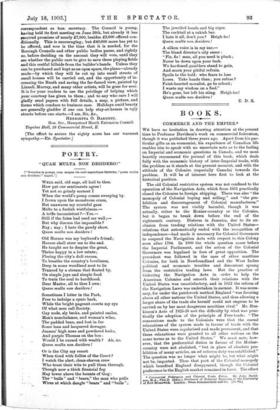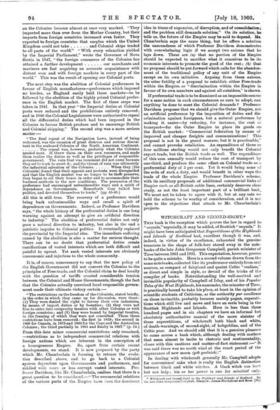BOOKS.
COMMERCE AND THE EMPIRE.* WE have no hesitation in drawing attention at the present time to Professor Davidson's work on commercial federation, though it was published three years ago. Apart from his par- ticular gifts as an economist, his experience of Canadian life enables him to speak with no uncertain note as to the feeling on Imperial and economic questions in Canada, and we most heartily recommend the perusal of this book, which deals fully with the economic history of inter-Imperial trade, with the problem as it stands at the present moment, and with the attitude of the Colonies (especially Canada) towards the problem. It will be of interest here first to look at the historical position.
The old Colonial restrictive system was not confined to the operation of the Navigation Acts, which from 1651 practically closed the Colonies to foreign shipping. There was also "the monopoly of Colonial buying and selling," and "the pro- hibition and discouragement of Colonial manufactures." The system was not visibly harmful, though it was actually, either to the Mother-country or the Colonies, but it began to break down before the end of the eighteenth century. Distress in Jamaica, due to its ex- clusion from trading relations with the United States— relations that automatically ended with the recognition of independence—had made it necessary for Colonial Governors to suspend the Navigation Acts with respect to this Colony soon after 1794. In 1806 the whole question came before the Imperial Parliament, and the action of the Colonial Governors was legalised in face of great opposition. The precedent was followed in the case of other maritime Colonies, for both in Newfoundland and the West Indies political and economic troubles and discontent sprang from the restrictive trading laws. But the practice of tinkering the Navigation Acts in order to help the American Colonies and smooth their relations with the United States was unsatisfactory, and in 1822 the reform of the Navigation Laws was undertaken in earnest. It was neces- sary, for under the patchwork method England "was favoring above all other nations the United States, and thus allowing a larger share of the trade she herself could not engross to be carried on by her most dangerous maritime rivaL" Mr. Hus- kisson's Acts of 1825-26 met the difficulty by what was prac- tically the adoption of the principle of Free-trade: "The concessions made to the Colonists were that the casual relaxations of the system made in favour of trade with the United States were regularised and made permanent, and that these relaxations were granted to all other nations on the same terms as to the United States." We must note, how- ever, that tbe preferential duties in favour of the Mother- country were not abolished, "but in place of absolute pro- hibition of many articles, an ad valorem, duty was established." The question was no longer what might be, but what might not be, imported. Thus that part of the Colonial monopoly which benefited England disappeared, though the Colonial preference in the English market remained in force. The effect • Commercial Federation and Colonial Trade Policy. By John David- son, 11.A., PhiLD. (Edin.), Professor of Political Economy in the University of New Brunswick. London Swan Sonnenschein and Co. [2s. 6d.]
on the Colonies became almost at once very marked. "They imported more than ever from the Mother Country, but their imports from foreign countries increased even faster. They exported to foreign countries that surplus which the 'United Kingdom could not take and Colonial ships traded to all parts of the world." "With every relaxation yielded by the Imperial Parliament," wrote the Governor of Nova Scotia in 1847, "the foreign commerce of the Colonies has attained a further development our merchants and mariners are fast acquiring an accurate acquaintance with distant seas and with foreign markets in every part of the world." This was the result of opening our Colonial ports.
The next step was the abolition of Colonial preferences in favour of English manufactures—preferences which imposed no burden, as England easily held, these markets—to be followed by the abolition of the highly prized Colonial prefer- ence in the English market. The first of these steps was taken in 1841. In that year "the Imperial duties at Colonial
ports were reduced and the prohibitions entirely removed; and in 1846 the Colonial Legislatures were authorised to repeal all the differential duties which had been imposed in the Colonies to favour British produce and to encourage British and Colonial shipping." The second step was a more serious matter :—
" The final repeal of the Navigation Laws, instead of being welcomed, was the occasion of great distress and serious discon- tent in the seaboard Colonies of the North American Continent.
The repeal was, however, probably what the Colonies needed most. It threw them on their own resources, and mule them realise the duties as well as the privileges of responsible government. The ruin that was imminent did not come because they set to work to avert it; and the threat of ruin was ultimately the industrial salvation of the Colonies When they [the Colonists] found that their appeals and protests were disregarded and that the English market was no longer to be their preserve, they began to set their house in order and to accommodate their business methods to the new conditions. The possession of the preference had encouraged unbusinesslike ways and a spirit of dependence on Governments. Henceforth they talked less politics, and devoted themselves to trade." (pp. 45-46.) All this is still true. The recovery of a preference would bring back unbusinesslike ways and recall a spirit of dependence on Governments. Indeed, as Professor Davidson says," the whole history of the preferential duties is one long warning against an attempt to give an artificial direction to industry." The abolition of preferential duties not only gave a natural direction to industry, but also in the end a patriotic impulse to Colonial politics. It eventually replaced the provincial by the Imperial idea. The immediate suffering caused by the abolition is also a matter for serious thought. There can be no doubt that preferential duties create ramifications of vested interests which are both difficult and painful to uproot. Yet such vested interests are obviously uneconomic and injurious to the whole community.
It is, of course, unnecessary to say that the new policy of the English Government did not convert the Colonies to the principles of Free-trade, and the Colonial claim to deal locally with the question of tariffs created considerable tension between the Colonial and Home Governments, though the fact that the Colonies actually exercised local responsible govern- ment made their ultimate victory certain :— " The restrictions on the freedom of the Colonists, stated briefly, in the order in which they came up for discussion, were three: (1) They were denied the right to favour their own industries, by means of import duties or by bounties ; (2) they were not free to enter into reciprocity treaties with other Colonies or with foreign countries ; and (3) they were bound by Imperial treaties, in the framing of which they were not consulted. These three restrictions have been removed: the first in 1859; the second in 1868 for Canada, in 1873 and 1895 for the Cape and the Australian Colonies ; the third partially in 1881 and finally in 1897." (p. 54.) From this date minor commercial restrictions only remained, —restrictions as to independent commercial relations with foreign nations which are inherent in the conception of a homogeneous Empire. So, apart from certain recent developments, we stand. It is now proposed by the party which Mr. Chamberlain is forming to retrace the evolu- tion described above, and to go back to a Colonial system dependent upon Governments and preferences, and riddled with more or less corrupt vested interests. Pro- fessor Davidson, like Mr. Chamberlain, realises that there is a great question to be considered:—" The commercial relations of the various parts of the Empire have been the dominant idea in times of expansion, of disruption, and of consolidation; and the problem still demands solution." On its solution, he tells us, the future of the Empire may be said to- depend. Ma. Chamberlain says the same thing, but he offers a solution the unsoundness of which Professor Davidson demonstrates with overwhelming logic if we accept two axioms that he lays down. These are (a) that no portion of the Empire should be expected to sacrifice what it conceives to be its economic interests to promote the good of the rest ; (b) that no proposal should be put forward which calls for the abandon- ment of the traditional policy of any unit of the Empire except on its own initiative. Arguing • from these axioms, the utter futility of a proposal to establish either Free-trade within the Empire, or "discrimination within the Empire in favour of its own members and against all outsiders," is shown_ If preferential trade is to be dismissed as an impossible course for a sane nation in such circumstances as ours to adopt, can anything be done to meet the Colonial demands P Professor Davidson proposes that we should give the Outer Empire, not• an artificial preference by the imposition of duties and dis- crimination against foreigners, but a natural preference by making it easier—by reducing, for instance, the cost of transport—for the Outer Empire to place its goods on the British market: "Commercial federation by means of improved and cheaper freights and communications ! This proposal is not in the grand manner, but it is practicable," and cannot provoke retaliation. An expenditure of three or four millions sterling would not only benefit the Colonial export trade, but the British trade as well. The expenditure of this sum annually would reduce the cost of transport by one-third, and produce the same effect on Colonial trade as a preferential duty of 5 per cent. Yet it would bring none of the evils of such a duty, and would benefit in other ways the trade of the whole Empire. Professor Davidson's scheme, with its ancillary proposals of additional commercial links of Empire such as all-British cable lines, certainly deserves close study, as not the least important part of a brilliant book_ We must not be taken to agree with it, but at any rate we hold the scheme to be worthy of consideration, and it is not open to the objections that attach to Mr. Chamberlain's. projects.











































 Previous page
Previous page